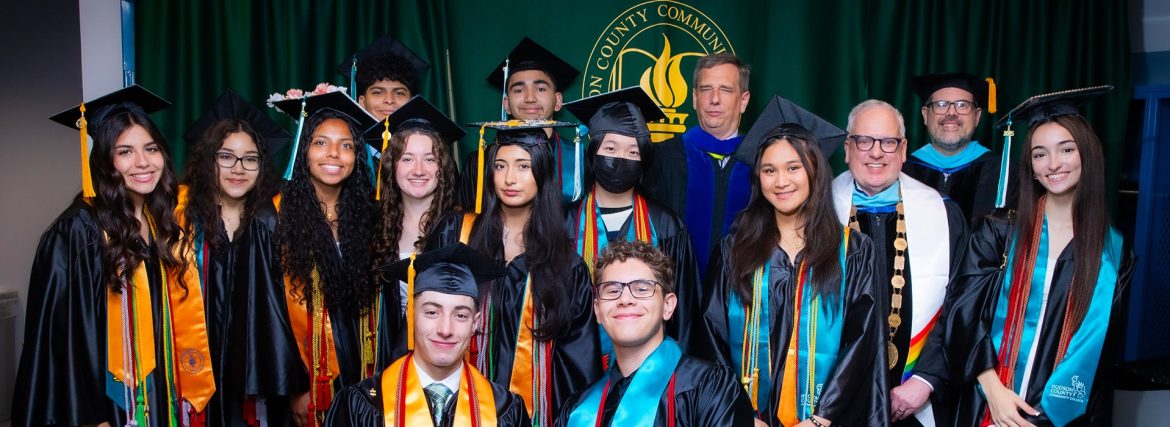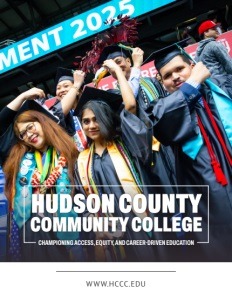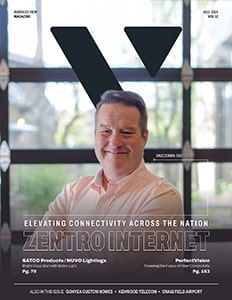Championing Access, Equity, and Career-Driven Education
When talking with the dedicated staff at Hudson County Community College, it is clear that a mix of passion, industry knowledge and an active interest in its students has positioned this innovative college as a leader in the nation. Located in the heart of Jersey City, Hudson County Community College (HCCC) has also pivoted to meet industry demands, solidifying its role as a dynamic institution offering a pathway to opportunity.
Serving one of the most culturally diverse student populations in the country, this community treasure is embracing bold and innovative strategies to meet the changing needs of education, workforce development, and social equity.
“We’re a comprehensive, urban, highly diverse institution,” says HCCC President, Dr. Christopher Reber. “We’re 87% non white and 56% Latino. We’re a proud Hispanic Serving Institution. The vast majority of our students are the first in their families to pursue a higher education credential, which means when they succeed, it’s life changing and transformational.”
That transformation, however, requires more than academic opportunity. Many HCCC students face profound challenges. “Well over 1000 of our students are learning English while they are here. Many are working full time while attending full time in order to support themselves and their families. Nearly thirty percent of our students are parents, many young single parents trying to navigate all the issues of raising kids while trying to pursue a degree,” Dr. Reber explains. “Unlike any place I’ve worked in my 45-year career in public higher education, our students are so exceedingly grateful for the opportunity to pursue a college degree. It’s fundamentally important to them and to their families and communities, and they’re incredibly dedicated, hardworking, and smart.”
Fostering Engagement and Belonging
Dr. Yeurys Pujols, Vice President for Institutional Engagement and Excellence, elaborates on HCCC’s inclusive and empowering environment. “We are firmly committed to promoting a welcoming and engaging campus community where every student, faculty, staff, and community member feels valued, supported, and can participate fully in the life of the college regardless of their background or lived experiences,” he shares. “Our mission is to offer educational programs that promote the social mobility of our entire community, one individual at a time.”
Providing opportunities for student engagement is a priority, and HCCC is committed to supporting student experiences beyond the classroom. Dr. Pujols describes a recent opportunity where he accompanied a group of students to participate in the Hispanic Association of Colleges and Universities’ annual Capitol Forum, a two-day conference held in Washington, D.C. where students meet members of Congress in advocacy sessions. Other recent programs include a Holocaust and Armenian Genocide Commemoration that included the participation of 40 students who visited the United States Holocaust Museum and the Armenian National Committee of America in Washington, D.C., and an annual Juneteenth Celebration, which hosted talent from the college, local high schools, and the community at large.
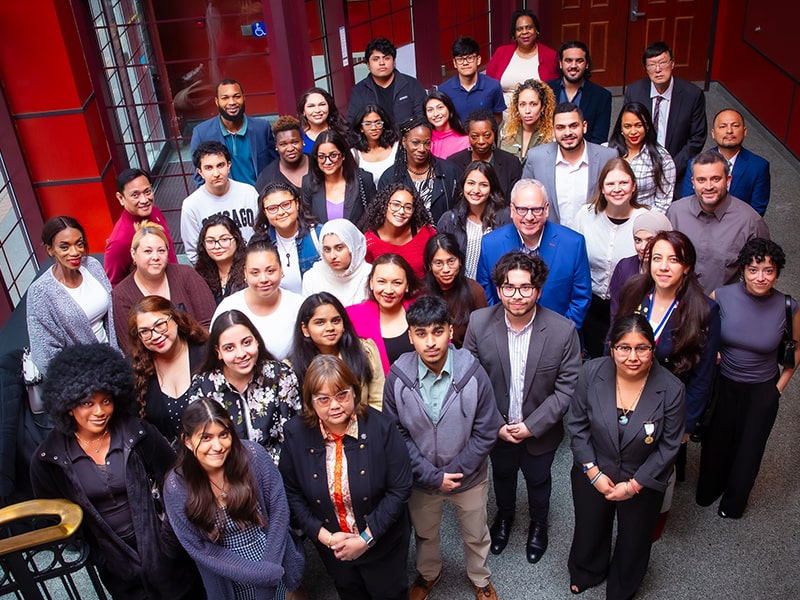
HCCC also promotes community engagement. “Our philosophy is that community engagement goes hand in hand with education. By hosting the community on our campuses, we welcome sons, daughters, parents, grandparents, and friends who might benefit from obtaining a college credential,” Dr. Pujols says. “So, they come to the college. They get to visit with us. They get to learn about everything we offer, and hopefully that leads to their enrollment and the fulfillment of our mission.”
The college’s focus on accessibility is equally impressive. “We always want to go above and beyond in our support for students to make sure we provide an environment in which people are not just getting by, but they are succeeding,” he remarks.

Linking Education and Workforce
Hudson’s workforce programs are attuned to the demands of the local and national economy. Initiatives include the Gateway to Innovation program, launched with support from JPMorgan Chase and bolstered by a $1.75 million U.S. Department of Labor grant. “It’s focused on financial services and technology, and we provide training that results in industry recognized credentials,” conveys Lori Margolin, Vice President for Strategic Initiatives, Continuing Education and Workforce Development.
“The program has been wonderful in helping train hundreds of students over the years. We also have a very active and vibrant employer advisory board that works closely with us to offer training and opportunities for work learning and employment.”
Healthcare remains one of the college’s most in-demand training areas. “We have health care programs that result in industry recognized credentials. We’ve been doing these for years. Classes always fill up,” she notes. A newer offering is film production.
“We recently launched our first class as part of the New Jersey Film Academy at HCCC,” she elaborates. “This is a collaboration among the community colleges. We’re really excited about offering this program.”
A degree apprenticeship opportunity with Eastern Millwork is another standout offering. Margolin recounts, “Students are typically hired after graduation from high school, and they enter into a five year apprenticeship. At the end, they have an associate degree from us, a bachelor’s degree from Thomas Edison State University, and they will be earning $70,000 a year with no college debt, all of it being paid by the employer. It’s just a tremendous opportunity for our students here in Hudson County and elsewhere.”
Clean energy is a growing focus, and a recent solar program was so popular it couldn’t accommodate the number of interested individuals. “The program was sponsored by one of our employer partners, Dimension Energy,” relays Margolin.
“We also had construction trade unions come in to talk to our students about what’s next for them, and the apprenticeship and employment options available.”
To support future opportunity, micro credentials are embedded directly into academic pathways so that when students complete a non-credit program, they can seamlessly earn credits toward an associate degree. “We have been able to increasingly bridge non credit and micro credentials, and segue these into a continuing academic pathway that can take students as far as they want to go educationally,” noted Dr. Reber.
Embracing Technology and AI
Over recent years, HCCC has invested in infrastructure aimed at expanding access to technology and improving the student experience. Tricia Clay, Associate Vice President for Information Technology and Chief Information Officer, outlines several initiatives designed to meet the evolving digital needs of students, including virtual desktop infrastructure (VDI), which allows access to HCCC desktops and software from any location complemented by a laptop loan program.

“We also set up video immersive classrooms,” she adds. “We have 64 currently, and that’s to add capacity between our Journal Square and our Union City campuses, and also to provide more engagement for students, faculty, and staff who are on either campus. It also gives us the ability to bring in outside experts.”
HCCC has also been designated a Cybersecurity Center of Excellence by the National Science Foundation. “We have a cybersecurity center in our STEM building that has its own network server and computer infrastructure for students to experiment with,” she explains. “As you might expect, we have to be careful with that because practicing cybersecurity related things can have unintended consequences.”
When it comes to AI, the college has developed a two-pronged approach. Academically, a professional learning community is exploring how to integrate artificial intelligence into classroom learning. This includes creating awareness among students, supporting faculty, and establishing clear guidelines around use. On the administrative side, a task force has been employed to evaluate technologies and infrastructure and to integrate AI into business operations.
“The goal is to be as streamlined for students as possible, make sure they have as much technology access as we can provide, and then guard everyone’s security and privacy,” Clay asserts.
Positioning for the Future
Through organizations like the Business-Higher Education Forum (BHEF), HCCC collaborates with industry giants and peer institutions to align programs with workforce needs. “The community college sector is essential to this work, because we are fundamentally providing access to parts of the population that traditionally have not been served by higher-ed or had the opportunity to earn a credential and move up in their careers,” Dr. Reber notes. “We serve traditionally underrepresented students, and citizens from marginalized communities. We meet them where they are and help them succeed.”
Noting that short-term credentials are tailored to emerging workforce needs and developed in partnership with local employers and advisory boards, Reber stresses that these should not become academic dead ends. “It’s always going to be important to have credentials and a degree to move up socioeconomically and advance in your career,” he reflects.
“We see ourselves at the nexus of the entire higher education spectrum, working very collaboratively with K-12, working with other two year, four year and graduate institutions to connect dots aligning all the credentials available to individuals, so they can go as far as they want to.” This is exemplified in HCCC’s initiative to co-enroll students with four-year institutions, giving them access to services and mentors at both campuses from the outset. “At the end of the day, both institutions win. But most importantly, the students and their families win,” says Reber.
Hudson County Community College is expanding its impact through innovations like the Hudson Scholars Program, a student success model built on mentorship, financial support, high-impact experiences, and early intervention. With over 5,000 students already involved and plans to scale college-wide, the program is seeing dramatic gains in retention, completion, and equity outcomes. Offering services like the Hudson Helps Resource Center and HCCC CONNECT, the college is redefining how it supports students, from enrollment through transfer and beyond.
Embracing the commitment to long term success, Dr. Reber imparts, “This work has grown exponentially and is now poised to redefine how our institution supports students and serves our community.”
AT A GLANCE
Who: Hudson County Community College
What: A community college supporting diversity, accessibility, and opportunity for all
Where: Jersey City, New Jersey
Website: www.hccc.edu
PREFERRED VENDORS/PARTNERS
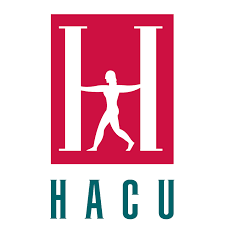
The Hispanic Association of Colleges and Universities (HACU) is a nonprofit 501(c) (3) organization representing more than 500 colleges and universities in the U.S., Latin America and Spain, and school districts in the U.S. HACU’s headquarters are in San Antonio, Texas with offices in Washington, D.C., Sacramento, California, and Chicago, Illinois.
Hispanic Association of Colleges and
Universities: www.hacu.net

Delta Dental of New Jersey, the state’s leading dental benefits provider, serves over 2.1 million people in New Jersey and Connecticut with dental and vision plans. Since 1969, its mission has been to promote oral health by delivering high-quality, accessible benefit programs of exceptional service and value.
Delta Dental of New Jersey, Inc.: www.deltadentalnj.com
